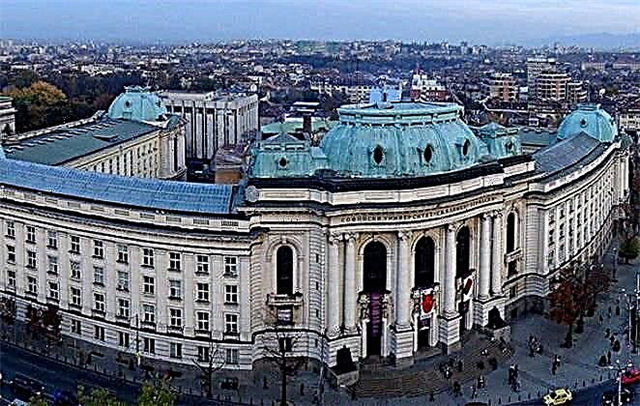Statistics show that the number of citizens of the post-Soviet states who give preference to higher education in Bulgarian universities is growing rapidly. Studying in this country opens up a number of prospects for foreigners. Bulgarian universities have been accredited in accordance with European requirements, therefore, the diplomas issued by them allow their holders to continue their studies and get a job on the territory of any state of the European Union (EU).

Features of the Bulgarian education system
There are three stages in the structure of the country's educational system: preschool, school and higher education. Preschool education is carried out in kindergartens, the attendance of which is considered compulsory, and lasts 4 years. The next 12 years are devoted to school education: primary (grades 1-4), basic (grades 5-8) and gymnasium (grades 9-12).
Higher education in Bulgaria is based on the principles approved by the Bologna Agreement, and involves the receipt of the following educational degrees by students:
- professional bachelor (study period - 4 years);
- bachelor (term of study - 4-5 years);
- Master's degree (term of study - 1-2 years with a bachelor's degree);
- Doctor of Sciences (term of study - 3 years after graduation).
The education system in Bulgaria provides for the functioning of educational institutions of both state and private forms of ownership.
Classification of Bulgarian universities
Today, the following types of higher educational institutions function on the territory of the country:
- colleges - educational institutions with a technical focus and allowing you to obtain the qualifications of a professional bachelor;
- specialized higher schools that train specialists in the field of art, science, military affairs, physical culture;
- universities that graduate bachelors, masters and doctors of science in natural, technical and humanitarian specialties.
The higher education system in Bulgaria includes 51 higher educational institutions, among which there are 30 universities, 13 specialized higher schools and 8 colleges.
The procedure for admission to Bulgarian universities
Before entering a university in Bulgaria, a foreign applicant may need to take paid preparatory language courses (depending on the chosen language of instruction), the duration of which is on average 9-12 months. This is due to the fact that one of the conditions for admission to local universities is the successful passing of a language exam.
Registration of applicants and admission of documents lasts from June 1 to August 30.
The package of necessary papers must contain:
- statement;
- a certificate of complete secondary education and an annex to it;
- a certificate from a medical institution on the state of health of the applicant;
- a copy of your international passport;
- color photographs.
All documents must be translated into Bulgarian and notarized. After their approval, you should contact the embassy in order to obtain a long-term visa type "D" (valid for 1 academic year and requires periodic renewal).
The best universities in the country
Before considering the specifics of studying at leading Bulgarian universities, it should be noted that education there is exclusively paid for both local and foreign students. However, as practice shows, the cost of educational services and expenses for everyday needs (rental housing, travel around the city, food, entertainment, etc.) are much lower here than in most European countries.
Below you will find a list of universities in Bulgaria that are considered the most reputable at the state and European levels, as well as brief information about them.
Education at the Sofia University named after St. Kliment Ohridski
This institution of higher education is one of the oldest in the country. It has been operating since 1888. More than 20,000 students study here. Teaching is conducted in Bulgarian, English and other languages.
Sofia University named after St. Kliment Ohridski is rightfully considered the largest research center in Bulgaria, it maintains constant cooperation with more than 80 foreign higher educational institutions and annually takes part in the implementation of dozens of progressive international scientific projects.
The structure of this university today includes 16 faculties, which provide training in more than 100 specialties. The most popular faculties of Sofia University in Bulgaria are commercial, informatics, journalism, legal and medical.
The annual tuition fee for undergraduate and graduate studies in Bulgarian is about 3,300 euros, for doctoral studies - 5,500 euros. Education in foreign languages is somewhat more expensive - from 3,850 euros per year. According to the website of the Sofia University of St. Kliment Ohridski, the most expensive are medical specialties - from 7,700 euros per year.
Education at the American University of Bulgaria
This higher educational institution is located in Blagoevgrad and has the status of one of the youngest universities in the country - the date of its foundation is 1991. A relatively small number of students study within the walls of this university - up to 1,000 people from more than 38 countries. About 70 teachers work here.

The American University in Bulgaria provides an opportunity to study undergraduate, graduate and doctoral programs in economics, computer science, mathematics, journalism, history, political science and other specialties. The average cost of studying at this educational institution is 9,700 euros per year. In addition, an applicant who has become a student at American University in Bulgaria must pay a compulsory student fee of 510 euros.
Advantages of the Technical University of Varna
Since 1962, one of the best technical universities in the country and Europe has been operating in the Bulgarian city of Varna. At the moment, there are 6 faculties in the structure of the university, uniting 23 specialties. Among the most popular areas for training students are shipbuilding, electronics, electrical engineering, mechanical engineering, chemistry.
Teaching is conducted both in Bulgarian and in Russian, English and other languages. The pricing policy of the Technical University of Varna is generally loyal to local students and foreigners. Thus, a year of study at a bachelor's degree in Russian costs from 2,000 euros, in a master's degree - from 2,200 euros. English-language study programs are slightly more expensive: from 2,900 (bachelor's degree) and 3,000 euros (master's degree) per year.
What New Bulgarian University offers to students
This university is located in the capital of the country - Sofia. It was founded in 1991. Currently, about 12,000 students receive higher education within its walls.
The new Bulgarian University provides an opportunity to obtain bachelor's, master's and doctoral qualifications in many specialties, including natural and technical sciences, art, telecommunications, philosophy, history, philology, computer science, mathematics, economics, law, health care, sports. There are training programs in Bulgarian and English. In addition, the structure of the university also has a Francophone department, whose students study social and political disciplines in French.
Tuition fees for bachelor's, master's and doctoral studies at the New Bulgarian University are from 1,350 euros per semester.Each student is required to pay the prescribed fee at the beginning of the academic semester.
Features of education at Veliko Tarnovo University "Saints Cyril and Methodius"
This higher educational institution was founded in 1963. At the moment, in terms of the number of students (about 18,000 people), it ranks second in the country, behind only the Sofia University named after St. Kliment Ohridski.
Veliko Tarnovo University has 9 faculties: philosophy, pedagogy, law, philology, economics, history, mathematics, theological and art history. The institution cooperates with a number of well-known European universities and is a member of the International University Association.
Veliko Tarnovo University Saints Cyril and Methodius offers undergraduate studies at a price of 1,250 euros, for a master's degree - from 1,500 euros, in doctoral studies - from 1,750 euros per semester. Payment for educational services is carried out by students every semester.
Higher education at the Free University of Burgas
In 1991, by the decision of the Great People's Assembly, one of the most popular higher educational institutions of modern Bulgaria was founded, which is known as the Burgas Free University. Currently, about 7,000 students study here.
The university enjoys great international prestige. Its teachers and students take part in the implementation of a number of research projects together with representatives of over 30 foreign universities. The university has signed cooperation agreements with more than 20 European and American educational institutions.
The Free University in Burgas includes four relatively independent centers: economic and managerial, legal, humanities, as well as computer science and technology. Tuition fees for bachelors and masters - from 1,200 euros per semester.
Medical education at Sofia University
The history of this higher educational institution goes back to 1917. It was then that, by decree of Tsar Ferdinand I, the Faculty of Medicine was opened at the Sofia University. Today, the university educates up to 8,500 students, more than 2,000 postgraduates, about 120 doctoral students and more than 20 clinical residents.
The Medical University in Sofia has 4 faculties (dental, medical, pharmaceutical, as well as the faculty of public health). In addition, the structural divisions of this institution are the medical college "Yordanka Filaretova", the Department of Language Education and Student Sports, as well as 14 specialized clinics. In mid-2009, Sofia Medical University opened its branch in the city of Vratsa on the basis of the local medical college.
The prices for studying at the university are as follows: bachelor's degree - from 1,500 euros, master's and doctoral studies - from 2,500 euros per semester.
Plovdiv Agrarian University
This institution of higher education is a leader in the training of qualified personnel in the agricultural sector in Bulgaria. It was created on the basis of the Faculty of Agronomy, which was opened in 1921 at the University of Plovdiv.

In the structure of the university there are faculties of agronomy, viticulture and horticulture, agroecology and plant protection, economics. During its existence, Plovdiv University has trained more than 30,000 graduates, including representatives of about 76 countries.
The cost of training for bachelors is from 1,500 euros, for masters - from 1,750 euros, for doctors of science - from 2,500 euros per semester.
Study at Southwestern University "Neofit Rilski"
The opening of this Bulgarian university, located in the city of Blagoevgrad, took place in 1976. Currently, the structure of this higher educational institution includes 9 faculties, uniting 40 departments and more than 800 teachers. The total number of students studying at the university today exceeds 11,500 people. Moreover, more than 1,000 students are representatives of foreign countries.
The number of structural divisions of the university includes about 30 research centers and laboratories. "Southwestern University Neofit Rilski" actively cooperates with a number of European, Asian, African, American universities. Students of this university have the opportunity to continue their studies in more than 60 countries around the world.
Payment for educational services is paid on a semester basis. Approximate prices: qualification level "bachelor" - from 1,500 euros, "master" - from 2,000 euros, "doctor of sciences" - from 2,500 euros per semester.
Higher technical education at the University of Sofia
The year 1953 was marked by the founding of the Machine-Electrotechnical Institute in the Bulgarian capital, on the basis of which the Technical University was established in 1995. About 18,000 students study within the walls of this university. The share of foreigners among them is more than 10%.
The Technical University in Sofia includes 11 main faculties and 3 functional ones, it has branches in the cities of Sliven and Plovdiv. Its structural subdivisions are Sofia and Sliven technical colleges, Sofia and Pravets secondary specialized schools. The teaching staff have developed and are successfully implementing educational programs both in Bulgarian and in other foreign languages, including French, German, and English.
The Technical University in Sofia offers applicants very affordable tuition fees. For example, full-time bachelors and masters pay an average of 1,500 euros, and part-time students pay 750 euros per semester. The cost of doctoral studies ranges from 1,000 (part-time) to 1,750 euros (full-time) per semester.
University "Angel Kienchev" in the city of Ruse
The founding date of this educational institution is 1945. In 1995, its reorganization was carried out, as a result of which the modern “Ruse University Angel Kienchev” emerged. Today, 499 teachers work within the walls of this higher educational institution, and the number of students receiving education here is about 10,000 people.
The university has 8 faculties. The most popular are pedagogical, legal, social and natural sciences, as well as computer science and mathematics.
The university has over 250 bilateral and multilateral educational partnership agreements with universities in more than 40 countries in Europe, Asia and America. Students and teachers annually take an active part in international scientific and practical conferences, forums, trainings. The cost of studying for a bachelor's degree is from 1,500 euros, for a master's degree - from 2,000 euros per semester.
What other Bulgarian universities do foreign applicants choose?
Many citizens of the post-Soviet countries strive to become students of such higher educational institutions in Bulgaria as:
- University of Shumen "Bishop Konstantin Preslavsky" (Shumen).
- Thracian University (Stara Zagora).
- University of Architecture, Construction and Geodesy (Sofia).
- University of Food Technologies (Plovdiv).
- National Academy of Film and Theater Arts (Sofia).
- Forestry University (Sofia).
- University "Professor Dr. Asen Zlatarov" (Pleven) and others.
It should be noted that many universities provide their students with the opportunity to receive non-core higher education along with mastering the main specialty.
Summarizing
Studying at one of the universities in Bulgaria is the first step towards getting a decent high-paying job abroad. The cost of higher education in this state is very democratic in comparison with the prices in force in universities in most European countries. At the same time, diplomas of bachelors, masters, doctors of science, issued by Bulgarian universities, are recognized throughout the European Union.Among the disadvantages of studying in Bulgaria are the need to renew the student visa annually, as well as the lack of free education.











